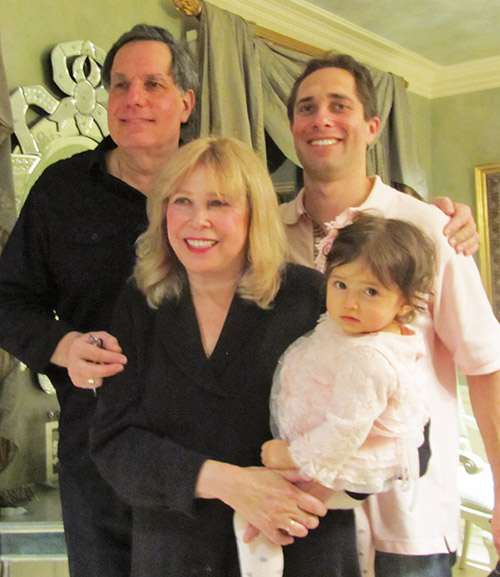
On paper, the odds appear against Dr. Andrew Rosenthal, but don’t tell him that. He’s a fighter and an optimist who has been there for countless others his entire career. Now, he’s now hoping just one person will be there for him as he races against time to obtain a match for his compromised kidney.
Rosenthal, known as “Dr. Andy,” a radiologist for over 35 years, described it as “a very rewarding career.” He went on to start a boutique home health-care agency and expressed how gratifying it was to be able to assemble a team of doctors within various disciplines to provide full services to the homebound.
Rosenthal knew from an early age he wanted to follow in his father’s footsteps and go into medicine. His father, whom he called “a wonderful man,” was known for his willingness to give of his time, taking calls all hours of the day or night from people seeking medical advice. This made a lasting impression.

Through word-of-mouth, Rosenthal also became a go-to person for medical advice. As he said, “It’s not easy for a lay person to navigate the medical landscape.” His advice would usually take the form of recommendations for the best doctor or hospital for a particular situation, or of weighing in on the optimal treatment plan.
On a number of occasions, his involvement has gone far beyond that. When a friend called and put him in touch with someone suffering from a painful disease similar to rheumatoid arthritis, Rosenthal not only located a nearby specialist but organized the man’s records and accompanied him to the doctor’s office as an advocate. He explained the man’s complicated history, prompting the specialist to inquire who he was. The patient answered simply, “He’s my friend,” which by then had become the reality. Rosenthal even ran interference with the pharmaceutical company when the needed drug proved cost-prohibitive. After hearing the man’s history, the company provided it at no cost.
When he was 21, Rosenthal met his wife, Karen, when moving into his medical school dorm. She was helping her brother get settled there. They tied the knot four years later and have been married 47 years. They have two grown children as well as a 12-year-old granddaughter Rosenthal absolutely adores.
There is a history of kidney disease in Rosenthal’s family. Although they don’t know the cause of his particular situation and why it has worsened, initially when a cyst was found on his kidney, it seemed under control with only a gradual decline in function. However, when he saw his nephrologist this past spring, it had deteriorated to the point that the doctor suggested he register for a transplant list. Rosenthal knew he had to act fast.

According to the National Institute of Diabetes and Digestive Kidney Diseases, the two most common causes of chronic kidney disease are diabetes and high blood pressure, with nearly one in three people with diabetes and one in five with high blood pressure sustaining damage. The reality is that being added to the transplant list and waiting for your name to be called has major drawbacks. For one, in 2021 there were over 90,000 people on its waiting list nationally, with less than 25,000 transplants performed. The wait time can be six or more years, although according to Rosenthal, it’s a bit better at Hackensack University Medical Center.
To make matters more difficult, the list is strictly for a kidney from a cadaver. Rosenthal explained that the logistics of icing a kidney and arranging for transport to the hospital can often encompass a number of hours, rendering the new kidney much less useful than one received from a live donor, where the transfer is immediate as both donor and patient are in adjacent operating rooms. Based on the time lag, Rosenthal estimates that a kidney from a cadaver may be effective for 7 to 12 years versus 20 to 30 years for a fresh donor organ. For all these reasons, his nephrologist suggested he also pursue the live-donor route.
Rosenthal has pursued a number of avenues in his quest for the optimal transplant. He signed up for Renewal.org, a Brooklyn-based organization that seeks to match donors and recipients, and has been singing their praises. Their model has been recognized nationally. Not only do they attempt to find a match, but they handle the myriad logistics as well, flying the person in and offering financial as well as emotional support. They have become the go-to organization for all kidney-related issues and emphasize what a great mitzvah it is to help in this endeavor. In fact, Rosenthal is featured on one of their ads, with the tagline, “Andrew has worked hard to make sure that all of his patients get the care they deserve. Now Andrew is the one in need of care. He is in dire need of a kidney transplant.”
Although social media does not come naturally for Rosenthal, he now has a dedicated Facebook page and has created a website, drandyneedsakidney.com, as well. He said his greatest wish is to be around to dance at his granddaughter’s wedding.
When asked what message he’d like to leave for Jewish Link readers, he paused, then said: “I’d like to leave a thank you for the people who read the article and spread the word. I’m not asking anyone to donate a kidney for me but to help raise awareness regarding organ donation.” His wife was more succinct, adding: “We’re looking for a really special person to give the gift of life.”
By Robert Isler









